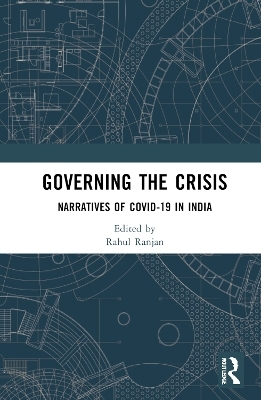
Governing the Crisis
Routledge India (Verlag)
978-1-032-45807-6 (ISBN)
- Noch nicht erschienen (ca. Februar 2025)
- Versandkostenfrei
- Auch auf Rechnung
- Artikel merken
The volume will greatly interest scholars and researchers in governance, medical anthropology, public policy, politics, sociology, and South Asian studies.
This book presents a multidimensional approach to understanding the effects of COVID-19 on the lifeworld of the marginalized communities in India. The essays in the volume pursue two interrelated concerns: first, they examine the governance aspect, highlighting institutional failures, a lack of political will, and ideological warfare. Second, they firmly position the crisis – as a narrative tool – at the heart of marginality, thereby explaining the effects of COVID-19 on communities that continue to remain at the nation's margins. The volume presents varied voices and granular narratives of sufferings that structured the lives of the poorest and dispossessed in the country during a crisis. It dovetails the reshaping of material forces that were crucially impacted by the failure of governance with the social lifeworld of those containing what can be referred to as intergenerational trauma. This volume offers a robust account of the crisis by combining these two distinct but complementary dimensions of COVID-19 in India.
The volume will greatly interest scholars and researchers in governance, medical anthropology, public policy, politics, sociology, and South Asian studies.
Dr Rahul Ranjan is writer and Lecturer (Assistant Professor) in Environmental and Climate Justice at the Department of Human Geography, School of Geosciences, University of Edinburgh. He is the author of “The Political Life of Memory: Birsa Munda in Contemporary India”, which was published by the Cambridge University Press in 2023, and edited a volume, “At the crossroads of Rights”, published by Routledge Press, London, 2022. Between 2020-2023, he held an appointment as a Postdoctoral Research Fellow to work on the project: “Riverine Rights: The Currents and Consequences of Legal Innovations on The Rights of Rivers”, funded by the Norwegian Research Council in Oslo, Norway.
Introduction Part I: Law, Biomedical Emergencies and Policy Response 1. Policing the Margins: Citizen-Police Interactions in India during Covid-19 2. India’s Fumbled COVID-19 Vaccine Policy 3. The Task Before Rebuilding: COVID-19 Second Wave in Jharkhand, Impact and Responses Part II: Migration, Indigeneity, and Cultural Impact 4. Navigating Medical Neglect and Care: COVID-19 Management and Adivasi Societies 5. Intersections of Covid-19 within Nomadic Lives: Nation-State Machinations & Pastoralism within the Gujjar & Bakarwal Tribe of Jammu and Kashmir 6. Covid-19 and the Indigenous Migrants’ Question in Urban India 7. Mobile Theatre of Assam: The COVID-19 Pandemic, Challenges, and Responses Part III: Frontline Workers, Caste Dynamics and Labour Force 8. The Last of Frontline Workers: Casteism and Precarity among Sanitation and Waste Workers during COVID-19 9. COVID and Other Crises: Brick Kiln Workers and the Dismal Work-Season of 2019-20 10. Community Resilience in the Western Himalayas: Lessons from the Pandemic
| Erscheint lt. Verlag | 25.2.2025 |
|---|---|
| Zusatzinfo | 6 Tables, black and white; 7 Line drawings, black and white; 7 Illustrations, black and white |
| Verlagsort | London |
| Sprache | englisch |
| Maße | 156 x 234 mm |
| Themenwelt | Sozialwissenschaften ► Politik / Verwaltung ► Politische Systeme |
| Sozialwissenschaften ► Politik / Verwaltung ► Staat / Verwaltung | |
| Sozialwissenschaften ► Soziologie ► Spezielle Soziologien | |
| ISBN-10 | 1-032-45807-0 / 1032458070 |
| ISBN-13 | 978-1-032-45807-6 / 9781032458076 |
| Zustand | Neuware |
| Informationen gemäß Produktsicherheitsverordnung (GPSR) | |
| Haben Sie eine Frage zum Produkt? |
aus dem Bereich


